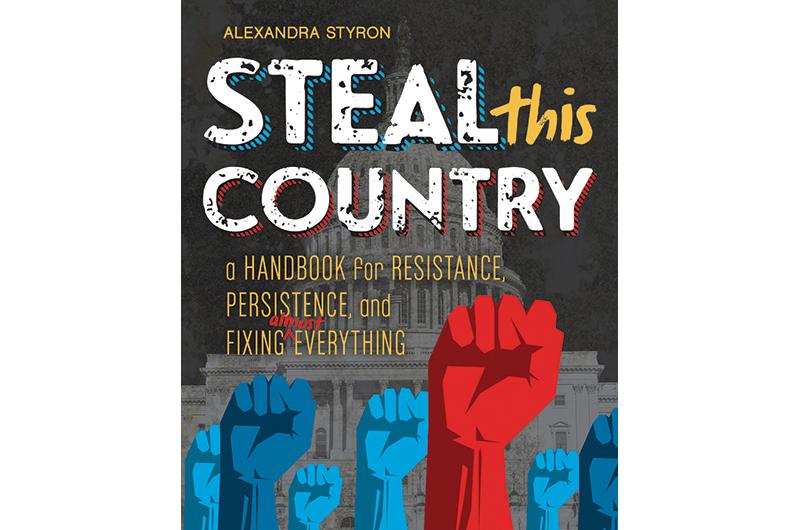The novelist and memoirist Alexandra Styron gives the first words in her surprising and spirited new book, Steal This Country, to Barack Obama. “Change will not come if we wait for some other person or we wait for some other time,” she quotes in the frontispiece. “We are the ones we’ve been waiting for. We are the change we need.”
Subtitled A Handbook for Resistance, Persistence, and Fixing (Almost) Everything, Styron’s book is a primer on social activism for young people, a lively assortment of essays, stories, interviews, drawings, photographs, and quotations that is designed to be both a wake-up call and a plan of action. In naming it, Styron took a cue from Abbie Hoffman, whom she describes as “a true rebel” and who wrote his cult counterculture classic Steal This Book in 1970.
In late July, Styron was sitting on her screened-in porch in Vineyard Haven looking over the author’s proof of Steal This Country, which has a bold graphic of red and blue fists raised against the image of the Capitol building on its cover. It is not an angry book, but it is an urgent one, which is clear from the mere fact that it has been barely a year since its subject first flashed through Styron’s head. She has been moved not only by her deep concerns for the future of the United States but more immediately for the future of its children.

“As the daughter of social activists, I had always wanted to create a good example for my own children, but after the 2016 election I felt that I had not done anything to counter the despair,” she said. With the assistance of her twenty-seven-year-old niece Lilah, a research assistant who has an R&B band, connections, and a valuable portion of cool, Styron wrote her book in three months, in time to be in bookstores by the midterm elections. It is her form of activism.
In some ways, Steal This Country is like a flip book about making the world better, or, as the civil rights hero John Lewis put it, about “getting into ‘good’ trouble.” (“Sometimes you have to get in the way,” Lewis also said.) With her two teenage children in mind, it is determinedly adolescent-friendly, fast-moving, informally organized, animated by illustrations and graphics, and builds its message on every page. Styron has divided her copious material into sections she calls “The Why, The Who, The What, and The How.” The first two are introductory, and the last is pragmatic.
The third section, “The What,” is the heart of the book, where she investigates the major areas of concern in the country today: climate change, immigration, LGBTQIA rights, racial justice, religious understanding, and women’s rights. These pages brim with the names, faces, words, and accomplishments of young reformers who have founded organizations and started movements in recent years: Ocean Clean Up, Youth for Black Lives, Color of Change, Redefy, FIERCE, UWD, OCT, NYCLU, EROC – persons and acronyms we may not yet know. For further enlightenment there is a useful glossary and an extensive reading and viewing list.
Styron’s book is about stories, she said, as is almost everything. “There is always an ‘I,’ which is reflected in a set of values, and you take those values and move forward. This book was built that way. Resistance is too.”

Styron’s first experience with protest came in the 1980s at Columbia University, where she joined fellow students who were chanting in protest against apartheid and the school’s investments in South African businesses. Making noise is one of the tools of protest found in Styron’s suggestions in “The How” chapter. Often, she reminds us, the world listens.
“The How” section is both a careful explainer and a thoughtful send-off in which she outlines the mechanics of sit-ins (“believe it or not, one of the most powerful political statements you can make is to sit your butt down”), walkouts, marches, petitions, starting groups, making calls (with a sample dialogue), and volunteering in political campaigns and beyond. She also has suggestions on how to assess the news, engage in social media activism, and talk to relatives you disagree with.
Styron is writing for all ages as she advises, “Listen and learn.” “Don’t expect a reward.” “Recognize the ways that other people struggle and you don’t.”




